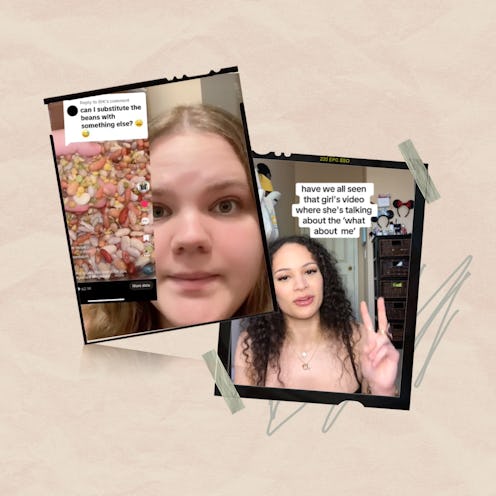Extremely Online
How TikTok’s Bean Soup Recipe Led People To Question The "What About Me?” Effect
Behind the internet's collective awakening.
One of the main ingredients of bean soup is, in fact, beans. If you’re a legume hater who stumbles upon a bean-filled recipe on TikTok, it would make sense to keep scrolling until you see a different one that better suits your tastebuds. It would make much less sense, however, to write a comment asking if it’s possible to make the bean soup without the beans — and yet, if you spend any amount of time online, then you know that this response is all too common.
It sounds like a bad Saturday Night Live skit, but this exact situation went down on TikTok after a creator posted a bean soup recipe and was immediately met with people (yes, plural) asking if it’s OK to replace the beans. This has since been dubbed the “bean soup incident,” and it’s become the perfect talking point for everything that’s wrong with the internet.
Asking to replace the main ingredient of a recipe is a bit wild. It’s akin to seeing if you could replace the mushrooms of stuffed portabellos or the onion of a French onion soup. It makes zero sense, which is why this incident has everyone on social media in a tizzy.
Ahead, everything you need to know about the viral bean soup incident, the “what about me?” effect, and why it’s led creators to suggest we all take a collective breath.
The Origin Of The Bean Soup Incident
On Aug. 18, TikTok user @vibingranolamom innocently posted a bean soup recipe, which was just one of her many food creations. Almost immediately, her comments flooded with typical questions like where to buy the best beans or what to use instead of kale. But when someone asked if it was possible to replace the beans, the internet lost its collective mind.
Leading the charge was @princess_milkyy, who shared a video in response to the comments on the OG recipe post. In her post, she said seeing someone’s question about replacing the beans flipped a switch in her head that unleashed a “wave of darkness that can only honestly be described as what the Joker went through.” Why, exactly? The answers to most of the bean soup questions were blatantly obvious or easy to figure out. She went on to say the people in the comments section were acting “as if it’s their first day on earth.” If you don’t like beans, she yelled, then “go crack open a can of chicken soup.”
The “What About Me?” Effect
User @sarahthebookfairy reacted to the bean soup incident with a hot take: This kind of response is a result of being chronically online. “I feel like it’s very easy to write it off as a lack of common sense or critical thinking, but I don’t think it’s that,” she said in a video. Instead of just saying, “If I don’t like beans, maybe I shouldn’t watch this bean soup video,” she noticed that people try to make everything about themselves in what’s been labeled the “what about me?” effect.
“The ‘what about me’ effect is when someone sees something that doesn’t really pertain to them, or they can’t fully relate to, but they find a way to make it about them or try to seek out certain accommodations for their very nuanced, personalized situation instead of recognizing that maybe they are just not the target audience for that thing,” she says in her post.
Once you start to noodle on it, you’ll realize that the “what about me?” effect is everywhere. Take fashion inspo videos, for instance, where a creator might share an outfit idea using wide-leg jeans. Inevitably, someone will rush to the comments to say, “But what if I don’t like wide-leg jeans?” Really, it doesn’t matter what you post about online — there will always be someone responding in a way that basically says, “But what about me?”
In @sarahthebookfairy's video, she said she cares about equity and inclusion, but... come on, people. We're talking about beans.
If You Don’t Like Something, Keep Scrolling
The bean soup incident shows how likely people are to rely on creators to answer their every question instead of doing their own research.
The “what about me?” effect also puts the onus on creators to constantly think 12 steps ahead to consider what someone might misconstrue or misunderstand, and as a result, videos often include 10-minute long disclaimers where users try (and fail) to predict every possible reaction or point of view.
It must be exhausting to deal with folks who are chronically online, and especially those who have gotten used to a perfectly-curated FYP. Creator @joannacastrejona reacted to the bean soup incident by blaming the algorithm, saying “People seem to be completely unable to grasp the concept that they aren’t the intended audience [of every video].”
If your FYP is absolutely perfect, it could come as a shock when a less-than-ideal TikTok pops up on your phone. But before you run to the comments, take a beat. According to @joannacastrejona, the moral of the story is this: “Do not let TikTok’s algorithm convince you that you need to be invested in bean soup when you don’t like beans. Just let it go. Just scroll away. It’s OK.”
This article was originally published on
